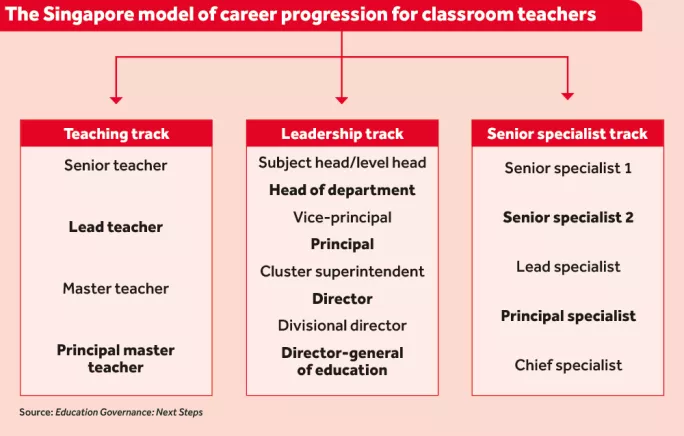‘We’ll copy Singapore to raise teachers’ ambitions’

Scotland is set to import a model from Singapore’s education system, as part of “radical” plans to make teaching more attractive by dramatically increasing career-progression opportunities.
The Scottish government also believes that this approach - in which teachers can choose from and move between three distinct career paths - could form an essential part of plans to devolve more power to schools.
But the broader plans, contained in long-awaited recommendations on school governance, are being criticised as too vague, and pointless without extra funding.
Opportunities for career progression for teachers in Scotland have shrunk over many years with the demise of posts such as assistant headteacher and chartered teacher. Principal subject teachers are also becoming increasingly rare, as most local authorities now prefer broader faculties.
The Education Governance: Next Steps paper states: “The lack of promoted posts in Scottish teaching, particularly in the primary sector, arguably does not enhance the idea of teaching as a profession with strong career-progression routes.”
‘A barrier to innovation’
The government wants to give schools more power to hire staff and design curricula, but fears the current lack of career paths is “a barrier to innovation and to building the necessary confidence required if schools are genuinely to lead the [education] system”.
Teaching careers in Scotland follow a largely linear path from the classroom to a dwindling number of leadership roles. Amid the current headteacher recruitment crisis, one commonly cited factor is a dearth of promotable posts that could act as stepping stones.
The government is “keen to learn from a range of international examples which support career progression”, the paper says.
It outlines the “three distinct career routes” in Singapore, which encompass 17 different jobs:
The “teaching track” targets those who want to stay in the classroom;
The “leadership track” rises to senior posts in school and the education authority;
The “senior specialist track” is for those keen to “break new ground” in areas such as curriculum design, testing, educational research and educational psychology.
Singapore topped the Programme for International Student Assessment (Pisa) results last December, as Scotland’s performance dipped.
Larry Flanagan, general secretary of the EIS teaching union, was wary of some of the mooted governance reforms, but welcomed the prospect of more career routes.
“With nearly 60 per cent of teachers remaining at the top of the pay scale for the bulk of their working lives, new career pathways beyond that point, with appropriate remuneration, are crucial,” he said.
Fast track to leadership
The reforms, which the government described as “radical”, also envisage “a mechanism to identify aspiring headteachers early in their career”, which would put them on a “fast-track leadership route”.
New senior roles of “executive head” and “cluster leader” aim to strengthen leadership beyond school level and encourage collaboration between schools.
Local authorities body Cosla has attacked the plans to devolve more power to headteachers instead of prioritising staff recruitment and curriculum design.
And George Gilchrist, a recently retired primary headteacher and fellow of the Scottish College for Educational Leadership, used his blog to question whether heads even wanted this extra responsibility. He wrote: “There are still too many headteachers, and teachers, who like being told exactly what to do, and they will have to move right out of their comfort zones.”
School Leaders Scotland general secretary Jim Thewliss warned that, while he backed many of the proposed reforms, the timescale was “ambitious”. He called for more clarity on roles such as executive head, and was concerned by the prospect of quicker routes into teaching, which Tes Scotland revealed earlier this month could open the door to organisations such as Teach First.
Seamus Searson, general secretary of the Scottish Secondary Teachers’ Association, said the governance plans would require extra money, as they “cannot be delivered by moving the existing resource around”.
University of Stirling professor Walter Humes, an expert in Scottish education history, said the plans were superior to many previous reform proposals because they drew on academic research and evidence from bodies such as the Organisation for Economic Cooperation and Development.
But he added: “It is a common failure of many organisations to see the need for change principally in structural terms when the problems may be more to do with culture.” The government paper “does not say nearly enough about how to transform the compliant and conformist attitudes that have been encouraged by previous attempts at educational reform”, he added.

You need a Tes subscription to read this article
Subscribe now to read this article and get other subscriber-only content:
- Unlimited access to all Tes magazine content
- Exclusive subscriber-only stories
- Award-winning email newsletters
Already a subscriber? Log in
You need a subscription to read this article
Subscribe now to read this article and get other subscriber-only content, including:
- Unlimited access to all Tes magazine content
- Exclusive subscriber-only stories
- Award-winning email newsletters